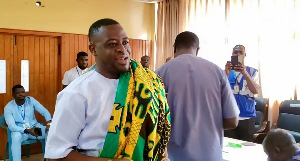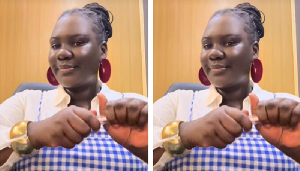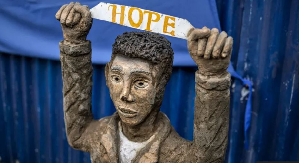The President of Ghana, His Excellency Flt Lt Jerry John Rawlings paid a historic official working visit to the United States from 8 - 9 March 1995 at the invitation of the White House.
During his visit, the President had an engaging working lunch with the U.S. President and held a series of meetings with other U.S. officials including Secretary of Commerce Ron Brown, National Security Advisor Anthony Lake, Deputy Secretary of State Strobe Talbott, and Deputy Defense Secretary John Deutch.
On Capitol Hill, President Rawlings met with member of the House International Relations Committee chaired by Congressman Benjamin Gilman; its sub-committee on Africa chaired by Congresswoman Eleana Ros-Lehtinen; and with some members of the Congressional Black Caucus under the leadership of Congressman Donald Payne. ON the Senate side, he was guest of the Senate Foreign Affairs sub-committee chaired by Senators Nancy Kassebaum and Russell Feingold.
To further Ghana s economic development prospects, President Rawlings and his delegation conducted intensive discussions with the heads of the World Bank, the IMF, the IFC and MIGA; delivered a major address on business opportunities in Ghana to U.S. corporate leaders at a dinner sponsored by the Corporate Council on Africa; and made a powerful statement on Ghana's role in conflict resolution and peacekeeping in Africa at a luncheon arranged by the Center for Strategic and International Studies, the Carnegie Endowment for International Peace and the Constituency for Africa.
President Rawlings also took the opportunity of his visit to make a case to the large Ghanaian population in the U.S. to return home to help in Ghana's economic reconstruction.
By all accounts, President Rawlings first official visit to the United States the first by a Ghanaian head of state in 30 years was a resounding success. As result of his visit, Ghana-U.S. relations are expected to be strengthened in the diplomatic, political, economic, business, educational and cultural fields. And the Liberian peace process, in particular, was given a further boost with indications of strong U.S. and United Nations support for the efforts of the chairman of the Economic Community of West African States (ECOWAS).
General News of Friday, 5 May 1995
Source: --












